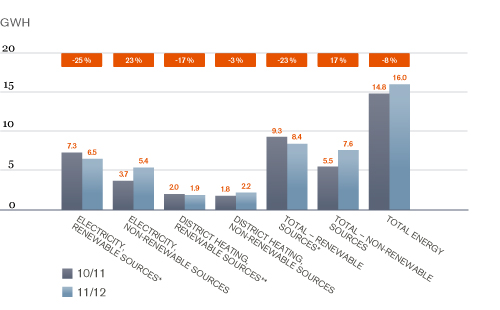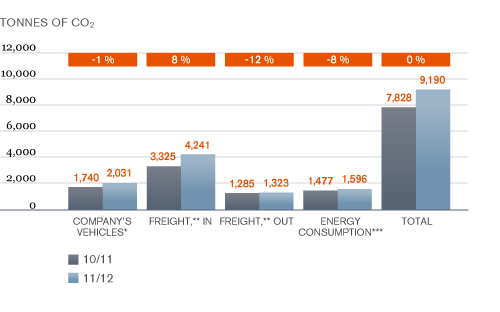The environment
Addtech conducts sales and distribution in more than 30 countries. The major share of the Group's purchases is made from suppliers outside the Nordics in Europe, the US and Asia, necessitating a large volume of transport movements. The Group's direct climate impact therefore largely comes from transporting goods from suppliers and to customers. Some of the Group's companies also conduct production involving the use of raw materials, chemicals and fossil fuels. However, production represents only a limited proportion of the Group's operations.
The aggregated environmental impact of the products that our companies provide also includes production operations at our suppliers and the way in which our customers use the products. As a result, we seek to take the entire lifecycle of our operation into account in the improvement work that is continually carried out in the Group.
Addtech's major environmental issues can be summarised as follows:
- Transport of goods and employee travel.
- Use/consumption of energy, raw materials and chemicals.
- Emissions and waste from production.
The Group's emission-related risks are associated in the main with emissions of carbon dioxide. Such emissions are caused primarily through combustion of fossil fuels within the Group's own operations, above all for transport of goods and employee travel, but also indirectly through procurement of electricity generated by combustion of fossil fuels.
The Group was not ordered to pay any fines in connection with breaches of environmental legislation during the year or in the preceding year.
Energy consumption
During the year, the Group's total energy consumption increased to 16.0 GWh (14.8 GWh). Of total energy consumption, electricity accounts for 74% and district heating for 26%. Of all energy supplied, 53% (63%) was generated from renewable sources. The rise in energy from non-renewable sources is largely attributable to the year's acquisitions. Relative to sales, the Group's total energy consumption during the year fell by 8% compared to the preceding year, which is in line with our ambition. One of Addtech's overarching goals is to reduce energy consumption over time relative to the Group's sales and to focus on continuously increasing the proportion of renewable-source energy used in its operations. The table illustrates the trend for energy consumption at Addtech.

The figures in the orange fields above the bars in the
charts state the change in relation to the Group's
sales.
*Solar power, wind power and hydro power
** Biofuel, waste heat, refuse/waste (70% renewable)
Climate impact
Addtech's impact on climate principally comprises emissions of carbon dioxide. Combustion of fossil fuels also produces emissions of other greenhouse gases, but Addtech has concluded that emissions of carbon dioxide represent the biggest threat from the Group's operations.
In the calculation of carbon dioxide emissions arising from electricity generation, a calculation has been based on Nordic electricity generation, where 1 kWh is estimated to generate 0.1kg CO2.
In addition to emissions arising from the internal use of fossil fuels and electricity, emissions of carbon dioxide are also generated by various kinds of transport, including transport of materials and products, as well as employee travel. Addtech reports carbon dioxide emissions for employee travel and from transport of materials and products as shown in the following table, CO2 emissions.

The figures in the orange fields above the bars in the charts state the change in relation to the Group's sales.
*Based on reported number of kilometres driven and the average emission of CO2/km from the Group's vehicle fleet.
**Based on reports from transport providers, plus own calculations with the aid of ecotransit.org.
***Based on Nordic electricity generation, where 1 kWh is estimated to generate 0.1 kg CO2.
